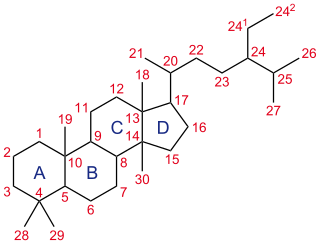
Clobetasol is a synthetic glucocorticoid corticosteroid which is marketed in Denmark. A propionate ester of clobetasol, clobetasol propionate, has also been marketed, and is far more widely used in comparison.

Prednimustine, sold under the brand names Mostarina and Sterecyst, is a medication which is used in chemotherapy in the treatment of leukemias and lymphomas. It is the ester formed from two other drugs, prednisolone and chlorambucil. Rarely, it has been associated with myoclonus.

Chlorproethazine, sold under the brand name Neuriplege, is a drug of the phenothiazine group described as a muscle relaxant or tranquilizer which is or has been marketed in Europe as a topical cream for the treatment of muscle pain. It has been associated with photoallergic contact dermatitis.

Bolasterone, also known as 7α,17α-dimethyltestosterone, is a 17α-alkylated androgen/anabolic steroid (AAS) which is used in veterinary medicine. It has close structural similarity to testosterone (medication)|testosterone, and like methyltestosterone has a methyl group at C17α in order to increase oral bioavailability. In addition, it is also 7α-methylated, similar to its 7β-methylated isomer calusterone. The medication has a low to moderate ratio of anabolic to androgenic activity, similar to that of fluoxymesterone.

Calusterone, also known as 7β,17α-dimethyltestosterone, is an orally active anabolic-androgenic steroid (AAS) that is used as an antineoplastic agent. It is a 17α-alkylated AAS similar in structure to bolasterone.

Oxymesterone, also known as methandrostenediolone, as well as 4-hydroxy-17α-methyltestosterone or 17α-methylandrost-4-en-4,17β-diol-3-one, is an orally active anabolic-androgenic steroid (AAS). It was known by 1960.

Chloral betaine, also known as cloral betaine (INN), is a sedative-hypnotic drug. It was introduced by Mead Johnson in the United States in 1963. It is a betaine complex with chloral hydrate, which acts as an extended-acting formulation of chloral hydrate which is then metabolized into trichloroethanol, which is responsible for most or all of its effects.

Hydrocortamate is a synthetic glucocorticoid with anti-inflammatory and immunosuppressive properties. It is used topically to treat inflammation due to corticosteroid-responsive dermatoses.

Oxabolone is a synthetic anabolic-androgenic steroid (AAS) of the nandrolone (19-nortestosterone) group which was never marketed. It can be formulated as the cipionate ester prodrug oxabolone cipionate, which, in contrast, has been marketed for medical use.

Cinnamedrine, also known as N-cinnamylephedrine, is a sympathomimetic drug with similar effects relative to those of ephedrine. It also has some local anesthetic activity. Cinnamedrine was previously used, in combination with analgesics, as an antispasmodic to treat dysmenorrhea in the over-the-counter drug Midol in the 1980s. There is a case report of the drug being abused as a psychostimulant.

Butidrine (INN), or butedrine or butydrine, also known as hydrobutamine or idrobutamine, is a beta blocker related to pronethalol and propranolol that was developed in the 1960s. Similarly to certain other beta blockers, butidrine also possesses local anesthetic properties.

Metogest, also known as 16,16-dimethyl-19-nortestosterone, is a steroidal antiandrogen that was patented in 1975 and investigated as a treatment for acne but was never marketed.

Algestone acetonide, also known as algestone 16α,17α-acetonide or 16α,17α-isopropylidenedioxyprogesterone, is a progestin which was never marketed. It is the acetonide cyclic ketal of algestone. Another progestin, algestone acetophenide, in contrast, has been marketed.

Diflorasone is a synthetic glucocorticoid corticosteroid which was never marketed. A diacetate ester of diflorasone, diflorasone diacetate, in contrast, has been marketed.

Endrisone (INN), or endrysone (USAN), is a synthetic, steroidal glucocorticoid which is or has been marketed in Italy by SIFI. It is used as a topical and ophthalmic anti-inflammatory drug in the treatment of skin and eye conditions, respectively.

Spiroxasone is a synthetic, steroidal antimineralocorticoid of the spirolactone group which was developed as a diuretic and antihypertensive agent but was never marketed. It was synthesized and assayed in 1963. The drug is 7α-acetylthiospirolactone with the ketone group removed from the C17α spirolactone ring. Similarly to other spirolactones like spironolactone, spiroxasone also possesses antiandrogen activity.
Prednazoline, a compound of prednisolone phosphate with fenoxazoline, is a synthetic corticosteroid as well as vasoconstrictor and α-adrenergic sympathomimetic.

Timobesone is a synthetic glucocorticoid corticosteroid which was never marketed.

Cortobenzolone, also known as betamethasone salicylate, is a synthetic glucocorticoid corticosteroid and corticosteroid ester which is marketed in Spain.

Pirenperone (INN, USAN, BAN; developmental code names R-47456, R-50656) is a serotonin receptor antagonist described as an antipsychotic and tranquilizer which was never marketed. It is a relatively selective antagonist of the serotonin 5-HT2 receptors and has been used in scientific research to study the serotonin system. In the 1980s, the drug was found to block the effects of the lysergic acid diethylamide (LSD) in animals, and along with ketanserin, led to the elucidation of the 5-HT2A receptor as the biological mediator of the effects of serotonergic psychedelics.





















